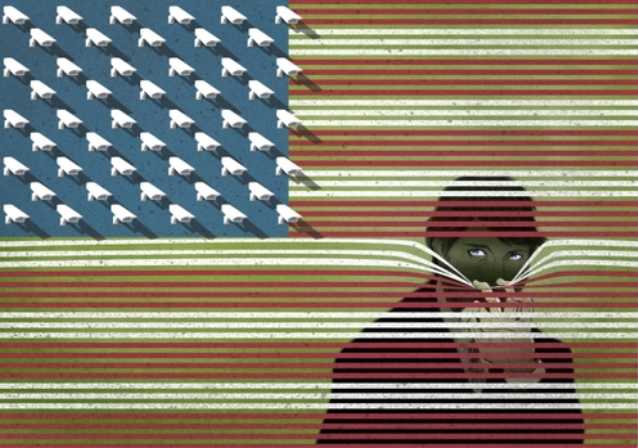
Total surveillance
The total surveillance state that developed in the U.S. after 9/11 under George W. Bush and that has continued with as much or more energy under Barack Obama has, among other things, been an exercise in negative diplomacy.
Few things have outraged the leaders of countries friendly with the United States as learning that U.S. intelligence services had been listening to their phone conversations and/or reading their text messages and email. German Chancellor Angela Merkel, as staunch a U.S. ally as they come, was angry enough to personally call President Obama to complain and demand an explanation. Dilma Roussef, Brazil’s president, also protested strongly but did not stop there. In a stinging snub, she cancelled her attendance at a White House state dinner that had long been organized to honor her, a rare distinction accorded to few heads of state in the world.
Last week, the surveillance state’s proclivity for angering friends and antagonizing allies went domestic. California Senator Dianne Feinstein, chair of the U.S. Senate intelligence committee, previously known as a steadfast defender of the U.S. intelligence community or, in the view of progressives including myself, an abject apologist for the surveillance state, lashed out against the CIA for allegedly spying on and impeding the committee’s investigation of the agency’s use of torture and other abuses euphemistically called “enhanced interrogation techniques.”
The agency secretly hacked into computers the committee used for its investigation and accused Senate staffers of breaking the law by accessing computer files they were not authorized to view. Feinstein says the agency has broken the constitutional principle of separation of powers and might seek legal action against CIA personnel. CIA director John Brennan said the agency acted appropriately and referred some Intelligence committee staffers to the Justice Department to investigate whether they had improperly accessed classified information.
At the heart of the dispute is a draft of an internal CIA review of its own conduct in relation to the harsh interrogations. That internal review, which the CIA had not wanted to disclose to the intelligence committee, revealed an even more disturbing picture of the whole operation than even the committee’s investigation had uncovered. At some point Feinstein staffers obtained access to the document. When the CIA realized it, it set out on its own investigation of how the committee came to acquire the damning internal report. This is where the rifling of Senate computers comes in.
The war between two powerful branches of government that the affair has provoked could lead to a constitutional crisis and involve dueling calls for prosecution. By law, the CIA is not allowed to engage in domestic spying. Spying on the Senate raises the additional question of whether the principle of separation of powers has been breached.
The Feinstein-CIA imbroglio is an especially stark demonstration of the extent of the metastasis the surveillance state has undergone since September 11, 2001. What started as gathering intelligence to foil terrorism and punish terrorists has spun out of control. Intelligence is being used to carry out hundreds of robotized targeted assassinations via drones. These attacks often miss the target and instead kill civilians peacefully attending a wedding or just going on about their lives.
On the surveillance front, information disclosed by Bradley Manning through Wikileaks and by Edward Snowden have revealed a brave new world of massive gathering of telephone and email data on tens or hundreds of millions of Americans and foreigners.
None of this is supposed to be happening. Barack Obama campaigned against the violation of privacy and the use of torture. Yet when he became president his Justice Department declined to prosecute those up and down the chain of command who had participated in torture, a serious crime under both U.S. and international law. Obama also increased the number of drone strikes. These often took place without the knowledge or approval of the governments where the strikes were taking place, a breach of international law and a very effective form of negative diplomacy, especially in relation to the average person in the countries affected. And Obama expanded rather than curbed the scope of phone and email surveillance.
The disparity between Obama’s campaign rhetoric and his actions as commander-in-chief show how deep-rooted the total surveillance state has become and how the endless “war on terrorism” continues unabated except for the dropping of the name.
Dianne Feinstein’s public attack on the CIA is evidence of the intelligence agency’s overreach. Feinstein, who has called Edward Snowden a traitor and not a whistle-blower, has until now practiced a virtually “see no evil hear no evil” approach to intelligence oversight. The CIA could have had no better or more useful friend on Capitol Hill. Count this as yet another failed CIA operation in which the costs far exceed the benefits.
How come Feinstein’s indignation now? There is, most obviously, the fact that this time her committee was the target of actions she had previously approved of when they were applied to others. Then, hopefully, the horrible details of the interrogations revealed by her committee’s investigation and the CIA’s efforts to cover up the whole truth to this day (as evidenced by the agency’s effort to bury its own internal review) finally stirred Feinstein’s conscience.
Despite Feinstein’s new feistiness regarding the CIA, one that may be short-lived, there is far too few checks on the surveillance state to hope that it will stop expanding, never mind that it will retrench.
Welcome to the age of total surveillance.

